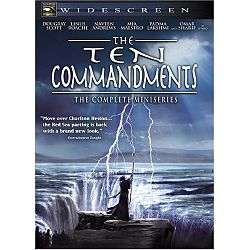The Ten Commandments (miniseries)
| The Ten Commandments | |
|---|---|
 | |
| Written by | Ron Hutchinson |
| Directed by | Robert Dornhelm |
| Starring |
Dougray Scott Naveen Andrews Omar Sharif Linus Roache Paul Rhys |
| Theme music composer | Randy Edelman |
| Country of origin | United States |
| Original language(s) | English |
| Production | |
| Producer(s) |
Bernard Dudek Robert Halmi Sr. Paul Lowin |
| Running time | 167 minutes |
| Distributor | ABC Television |
| Release | |
| Original network | ABC |
| Original release | April 10[1] – April 11, 2006 |
The Ten Commandments is a 2006 miniseries that dramatizes the biblical story of Moses. It ran on the ABC TV network.
Plot
Moses's mother, Jochebed, saves her baby from the edict of the Pharaoh that all newborn male Hebrew children must die by placing him in a basket on the Nile River. He is found by Pharaoh's daughter Bithia and adopted into the royal house.
Some time later, Bithia gives birth to a son Menerith, and they are raised as brothers. Moses grows up knowing that he is not the blood brother of Menerith, but is shown his true heritage (something he knows nothing about) at about the age of 10: he is re-introduced to Jochebed, his father Amram, his brother Aaron, and his sister Miriam.
Some years later, Moses saves the honor of a Hebrew woman by killing an Egyptian. When the body is discovered, Pharaoh orders Moses' arrest, but he is able to escape with the aid of Menerith.
After traveling days through the desert, he saves the seven daughters of Jethro from attackers. In gratitude, Moses is given the choice of one of them to take for his wife. After refusing, he is convinced by Zipporah to marry her.
Moses, wanting to know why God allows the Hebrews to be enslaved, climbs Mount Horeb and is confronted by God in the form of a bush that burns but is not consumed. God tells Moses that "I am who I am" and endows Moses with the knowledge to free the Hebrews.
Because Pharaoh Ramesses refuses to free the slaves, Egypt is struck with ten plagues. Only after the final one, during which Pharaoh's beloved son dies, are the slaves freed. However, Pharaoh decides to try to re-capture them.
The former slaves are guided to the Red Sea by a cloud. When the Egyptians' chariots get near, God blocks their path and Moses parts the Red Sea, providing the Hebrews an escape route. When the Hebrews make it to the other side, Moses closes the separated waters, drowning the pursuing Egyptians — including Menerith.
Moses climbs the mountain to receive God's commandments in the form of two stone tablets. However, when he climbs down, he finds that many of the Hebrews have made a golden calf to worship. Moses destroys them and orders the deaths of the lawbreakers. The survivors plead to receive God's commandments and Moses climbs up the mountain again. After Moses reads the commandments, the tablets are placed in an ark.
The film ends with Moses looking at the promised land, but he is not allowed to enter because he disobeyed God.
Cast
- Dougray Scott as Moses
- Linus Roache as Aaron
- Naveen Andrews as Menerith
- Mía Maestro as Zipporah
- Paul Rhys as Ramses
- Richard O'Brien as Anander
- Silas Carson as Jered
- Padma Lakshmi as Princess Bithia
- Susan Lynch as Miriam
- Claire Bloom as Rani
- Omar Sharif as Jethro
Reception
Barry Garron of The Hollywood Reporter gave the mini-series a generally positive review, praising the performances as well as "the stunning cinematography and eye-catching special effects" but also noted that it "fails to take full advantage of the source material".[2] David Bianculli of the New York Daily News reviewed it as "Thou shalt not watch."[3] while Matt Roush of TV Guide wrote the film "violates the primary commandment of epic filmmaking, biblical or otherwise: Thou shalt not bore."[4] Matthew Gilbert of the Boston Globe called it "an empty inane remake."[5] and The Washington Post's Tom Shales calls it a "dreadful, doleful remake of Cecil B. DeMille's 1956 classic The Ten Commandments."[6]
References
- ↑ http://www.nytimes.com/2006/04/08/arts/television/08comm.html?_r=0
- ↑ Garron, Barry (2006). "The Ten Commandments". The Hollywood Reporter (online ed.).
- ↑ "'Ten' Inspires A Quick Exodus". Daily News. New York. April 10, 2006.
- ↑ The Ten Commandments: Season 1, Metacritic.com
- ↑ The Ten Commandments: Season 1, Metacritics.com
- ↑ Shales, Tom (April 10, 2006). "'The Ten Commandments': Exodus Comes to ABC". The Washington Post. Retrieved May 25, 2010.